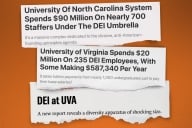You have /5 articles left.
Sign up for a free account or log in.
In a potentially significant legal win for state universities and gay students, a federal judge in California on Tuesday ruled that a public law school may deny recognition to a student group that refuses to abide by anti-bias rules.
The ruling came in a dispute between the University of California's Hastings College of Law, which bars officially recognized student groups from discriminating on the basis of religion and sexual orientation, among other factors, and the campus chapter of the Christian Legal Society. Students who engage in "unrepentant homosexual conduct" are barred from the group.
In the last two years, Christian and conservative legal groups have -- with some success -- been pushing public colleges that have policies like the one in place at Hastings to make exceptions for religious groups. Suits have been threatened and several colleges have backed away from their rules (sometimes quietly) to avoid litigation. In one previous case that has gone to court, a preliminary ruling suggested that the Christian student groups would prevail. Tuesday's ruling, however, accepted a legal argument that the Christian students' rights to freedom of religion and expression were not compromised by the Hastings rule.
Ethan P. Schulman, a San Francisco lawyer who represented Hastings in the case, said that the victory showed that colleges need not abandon their policies. "Hastings fought this case from the belief that discriminating student groups have no place on campus. Student groups should not be able to use religion as a pretext for discrimination," Schulman said.
Schulman added that conservatives who love to bash rulings that come from California jurists should note that the judge who issued the ruling, Jeffrey S. White, was appointed to the bench by President Bush.
The Hastings case went to court after a change in philosophy by the Christian Legal Society's chapter there, which had been previously recognized and which was for a period of time open to all students. During the 2003-4 academic year, however, the group affiliated with the national society, which enforces its rules against the participation of gay people. In September 2004, the Hastings chapter applied for law school funds to travel to attend the national meeting of the society, and was turned down because the group did not meet the Hastings anti-bias rules.
In suing Hastings, the Christian group argued that the state university was limiting the religious expression of students. But Judge White rejected that argument, saying that the Hastings policy "is directed at conduct, not speech." He said that if the Christian group admitted any student who wanted to join, it would have been allowed "to express any ideas or viewpoints." He added that applying the anti-bias rule did not bar the group's members from having any view they wanted on homosexuality or any topic.
Among the numerous Supreme Court cases Judge White cited was the unanimous March ruling in which a group of law schools lost their attempt to challenge the so-called Solomon Amendment, which threatens to withhold federal funds from institutions that limit military recruiters’ access to campuses, which many law schools historically have done to protest the Defense Department’s discriminatory policies toward gay people. The law schools argued that their First Amendment rights were trampled by the law, but the Supreme Court said that the law schools were free to protest the law, but Congress was free to impose limits on access to federal funds. Similarly, Judge White suggested, the Christian Legal Society is free to hold any beliefs or protest the support for gay people at Hastings, but Hastings can link recognition to following its rules.
Lara Schwartz, legal director for the Human Rights Campaign, said that the ruling was extremely important because conservative groups are trying "to chip away" at the protections colleges have added for gay students. When colleges given in to suits, or lose them, she said, gay students become "second class citizens."
Stephen H. Aden, chief litigation counsel for the Christian Legal Society, said that Judge White's ruling was "flat wrong" on many points, that the group would appeal, and that religious students were the ones in danger of being second class citizens.
Aden said that the Supreme Court has ruled in numerous cases that "association" with fellow members is a form of expression. "If you cannot limit group membership to those who agree with the group's purposes, the group's purpose will disappear," he said. Aden added that the society was "hampered and hurt" by its lack of recognition, and couldn't grow as fast as it would otherwise. While Judge White wrote that the group was allowed to use campus facilities, Aden said that this was severely limited and that the description of this situation was "one of the mischaracterizations" that would be cited on appeal.
Another recent federal court ruling suggests judicial backing for Aden's view -- and plenty of controversy likely to be ahead on this issue. In August, a federal appeals court, by a 2-to-1 vote, granted an injunction that restored the recognition for the campus chapter of the Christian Legal Society at Southern Illinois University at Carbondale. While that ruling was only on the injunction, not the merits of the case, it was strongly worded in a way that left lawyers on both sides of the case expecting the society to prevail (at least at this level). Similar disputes have been taking place at several institutions with regard to fraternities that admit only Christians.
Both Aden and Schulman predicted that -- if the courts continue to disagree about this issue -- it could become a hot judicial topic and might reach the Supreme Court. "This has been an important and unsettled part of the law," Schulman said.








